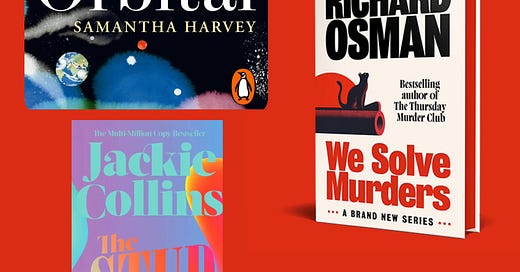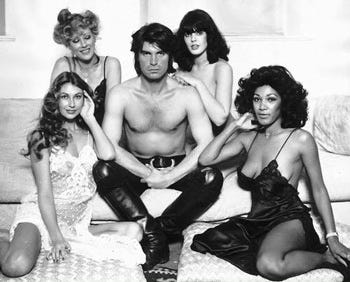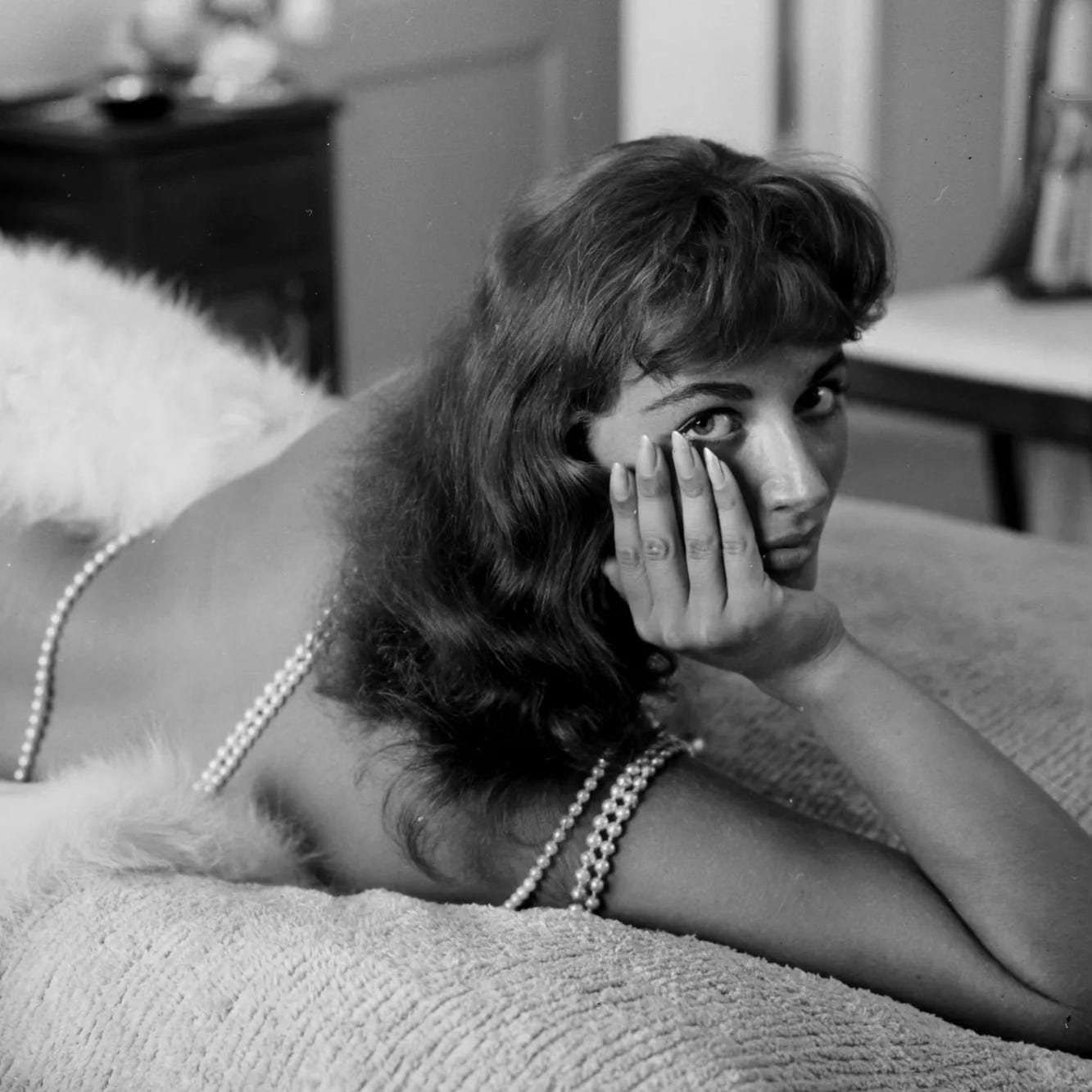Three Books That Got Me Through The Longest Month
Orbital by Samantha Harvey, We Solve Murders by Richard Osman and The Stud by Jackie Collins.
The secret to good writing is to read, read and read more and I have committed myself to reading as many books as possible. This month’s varied reading selection includes: A Booker prize winner, the original bonk buster, and one of today’s most popular cosy crime writers. To support my writing please consider taking out a subscription to the JasonWard Creative Substack which will give you access to hundreds of articles, interviews, reviews, podcasts, videos, playlists and a whole range of new fiction as well.
Orbital - Samantha Harvey
Winner of the 2024 Booker Prize, Samantha Harvey’s Orbital is a gorgeous book that you will want to cherish and hold close. The reader’s experience is the character arc and the plot is a travelogue that loops the earth in a titanium tin can far above the world and floating in a most peculiar way.
Ostensibly about life onboard the International Space Station, it uses the proscribed rhythms of life in space and the station’s 16 orbits a day as the basis for a meditation on what it is to be human and live on Planet Earth.
Each of the six astronauts and cosmonauts is given time in the book to reflect on their own lives and how much of themselves as people they give up to follow their space dreams. There is the personal and emotional loss of woman unable to get home to Japan for her mother’s funeral, the man who knows his marriage is collapsing and the conversations between two colleagues about creationism and science. Both realise that they agree the Universe was created by a great force and that they are arguing to give the same event different names.
The changes that space travellers experience are not just spiritual; bones thin, muscles waste and the heart muscle is worn down meaning that the astronauts return to earth as spindly legged weaklings who will need to be helped out of their re-entry craft when it finally crashes down somewhere in Kazakhstan.
In our ever more divided and polarised world, Harvey uses the ISS as a metaphor for how our inter-dependencies should bring us closer together. The crew travelling at 17,000mph, 230 miles above their home rely on each other for medical and psychological support but also more primary concerns; all urine is recycled into drinking water.
The prose in Orbital is elegant and hyper evocative with a certain showiness to the language which never gets in the way of a beautiful love letter to our planet and its people.
We Solve Murders - Richard Osman
We all know that Richard Osman can write a funny, warm hearted mystery. From reading We Solve Murders, we also know that he must have some strong hypnotic power over the publishing industry. He controls the minds of editors who wave through his first draft like a stormtrooper waving droids through an Imperial security check at Obi-Wan’s suggestion.
Publishers are enamoured at his petty snobbiness especially towards working class characters who seem trapped in a single dimension: seriously, an experienced, retired Police Detective who doesn’t know to take his shoes off in a sauna is contrasted with the fabulously wealthy writer, Rosie D’Antonio, who is sophisticated, unburdened and sexually voracious living her best life of private islands and jets into her 70s. Is this how Osman sees himself; the boy from nowhere (well, Billericay), who has become a darling of the middle classes with his cleverness and arch humour. And you wonder who at Endemol, the Dutch TV company where Osman used to work, inspired Henk whose ‘Dutchness’ is expressed by his overly precise attitude to everything: “it’s not a small envelope, it’s A4” - those foreigners are funny aren't they?
Then there is Bonnie the ‘paint influencer’ who has lived a life so sheltered that she doesn’t know how to pack a suitcase, despite being the mother to two children. ‘Oh how we laugh at the peasantry and their peasant ways’ chortles Osman, forgetting his own origins and embracing even further his adoption of rich, entitled boy manners learnt from his posh friends at Cambridge and TV industry suppers.
Somewhere along the way Osman and his team have forgotten what made his first books so wonderful; characters. He wrote people we believed, that we fell in love with and cared about because Osman felt the same way about them. In We Solve Murders, we care little about Amy the bodyguard, her father-in-law, the ex-detective Steve Wheeler or any of the cast of hitmen, Mafia bosses, criminals and others because they have no depth or purpose except to provide zingy one liners such as Steve’s brilliant “I don’t wear sunglasses- I’m not a male model.” Osman is no longer the loving and nurturing father of his characters but, instead, the world weary University professor who knows he only has to put up with these kids for a few hours a week until they graduate. He shares knowledge, he hopes for the best, but there will be a new intake along soon and there’s also so much other stuff going on his life.
Richard Osman is a very funny writer who knows how to make the mundane and human into something hilarious and special. He does not achieve that with this book and it feels as if We Solve Murders which has overstretched him - it also runs too long at over 400 pages and, despite the laughs, does not quite hit the spot. Could do better and I hope the next book in the series is a return to form.
The Stud - Jackie Collins
Jackie Collins was so far ahead of her times while also being anchored securely in them. In The Stud the world’s wealthy are immoral, bitchy and sexually voracious:married women have affairs, married men have affairs and all male hairdressers are gay. What gives this book life is Collins’ vivacious writing style that cleverly utilises multiple points of view to interpret London’s swinging 60s set. Fontaine, the wealthy married woman, is ‘enjoying’ a purely sexual relationship with Tony, a working class lad making his way up in the world who is endowed with charm and a seemingly huge cock. He is the eponymous Stud who Fontaine is training to be a ‘better’ lover - although she doesn’t mind a quickie in the lift. She has also set him up (using her rich husband’s money) as the manager of a nightclub called ‘Hobo’ making him a kept man. She knows he is screwing around and even sets up a four way with herself, Tony and a married couple that she knows.
In this book (and until fairly recently) 16 year old posh girls and 61 year old widowed women from Miami are all legitimate sexual partners - it’s about scores on the doors and notches on bedposts. The writer always claimed that there was nothing in her books that she had not seen happen and who are we to challenge her? My mother worked in West End nightclubs in the 60s and told me that there was nothing I could do to shock her '“because I’ve probably already seen it done in a jacuzzi anyway.”
Jackie Collins gives us the 1960s so vividly with swinging scenes, birds and men touching waitresses’ arses, but all the while she is subverting and undermining our learnt opinion of the era as a wonderful, liberal epoch. The fact is that for all the sex, drugs and rock and roll, The Stud is a book about the corruptness of the English class system and the toxicity of traditional male values because, in this book, the only power that women have is derived from attractiveness and while Fontaine Khaled uses this very effectively, she is still never truly independent.
I can remember that Jackie Collins’ books were scandalous because, it was said, people did not know that women had strong sexual desires and talked about them with other women. Obviously the ‘people’ referred to in the sentence is men.
Despite its frothiness and bonkbuster reputation The Stud has plenty to say that still resonates today. Could it be time to re-evaluate the Collins collection? I think so.
Thanks for reading this week’s post and I hope you enjoyed it. To support my writing and get access to hundreds of articles, podcasts, playlists, videos and new short stories please consider taking out a subscription.








